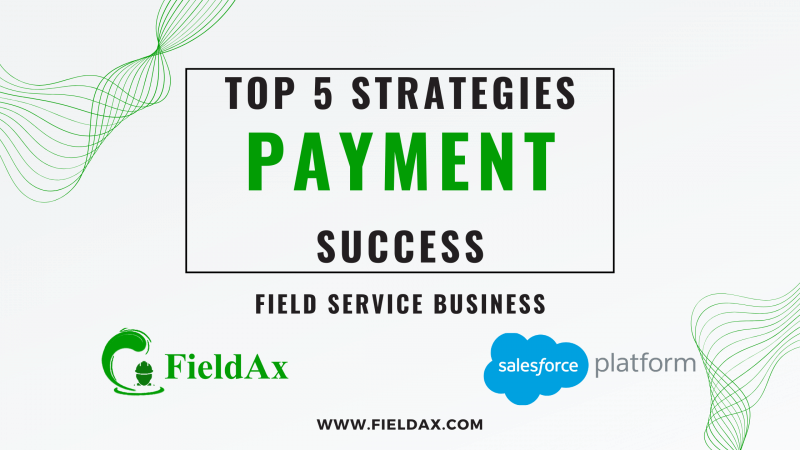In today’s competitive business landscape, field service companies face numerous challenges when it comes to collecting payments efficiently. It’s not enough to just deliver exceptional service, field service businesses need to have a payment strategy in place to ensure timely and secure transactions. In this article, we will reveal the top 5 strategies that can unlock the key to payment success for field service businesses.

Understanding the challenges of payment in field service businesses
Field service businesses, by nature, operate in a dynamic environment where technicians are constantly on the move, servicing customers at various locations. This adds complexity to the payment process, as businesses need to find ways to collect payments from customers who may not always be present at a fixed location. Traditional payment methods such as cash or checks are often impractical or inconvenient in these situations.
Furthermore, field service businesses often deal with a high volume of transactions, making it difficult to keep track of payments and ensure timely follow-ups. This can lead to delays in cash flow and potential disputes with customers. In addition, manual payment processing is prone to errors, which can further hamper the efficiency of the payment collection process.
The importance of a streamlined payment process
A streamlined payment process is crucial for field service businesses to ensure faster payments and maintain positive customer relationships. By implementing efficient payment strategies, field service businesses can minimize the time and effort required to collect payments, improving cash flow and reducing the risk of late or missed payments.
Not only does a streamlined payment process benefit the business, but it also enhances the customer experience. Customers appreciate convenience and flexibility when it comes to making payments, and a smooth payment process can contribute to overall customer satisfaction and loyalty.
Strategy 1: Implementing mobile payment solutions
One of the most effective ways to unlock payment success for field service businesses is by implementing mobile payment solutions. With the widespread use of smartphones and tablets, mobile payments have become increasingly popular and convenient for both businesses and customers.
Mobile payment solutions enable field service businesses to accept payments on the go, eliminating the need for cash or checks. Technicians can easily process payments using their mobile devices, providing customers with a seamless and efficient payment experience. These solutions often come with secure payment processing capabilities, ensuring the safety of customer data and transactions.
By adopting a mobile payment solution, field service businesses can significantly reduce the time and resources required to collect payments, improving cash flow and customer satisfaction. It also eliminates the risk of lost or misplaced payments, as all transactions are recorded digitally.
Strategy 2: Offering flexible payment options
In addition to mobile payments, field service businesses should also consider offering flexible payment options to cater to the diverse preferences of their customers. Different customers may have different payment preferences, and by providing multiple payment methods, businesses can accommodate their needs and improve the chances of timely payment collection.
Some common flexible payment options include credit or debit card payments, online payment gateways, and electronic fund transfers. By offering these options, field service businesses can give their customers the freedom to choose the method that works best for them.
Moreover, it’s important to ensure that the payment process is user-friendly and intuitive. Customers should be able to easily navigate through the payment interface and complete transactions without any hassle. Clear instructions and prompts can help guide customers through the payment process, reducing the likelihood of abandoned payments.
Strategy 3: Utilizing digital invoicing and billing systems
To further streamline the payment process, field service businesses should consider adopting digital invoicing and billing systems. Digital invoices can be sent directly to customers’ email addresses, eliminating the need for physical paperwork and postage. This not only saves time and resources but also reduces the chances of invoices getting lost or delayed in the mail.
Digital invoicing systems also offer features such as automated reminders and recurring billing, which can significantly reduce the administrative burden of payment collection. Businesses can set up automated reminders to notify customers of upcoming or overdue payments, ensuring timely follow-ups and reducing the chances of late payments.
Furthermore, digital invoicing systems often provide real-time tracking and reporting capabilities, allowing businesses to monitor payment statuses and generate comprehensive payment reports. This data can be invaluable for financial analysis and forecasting, enabling businesses to make informed decisions and optimize their payment processes.
Strategy 4: Implementing automated payment reminders and follow-ups
Timely payment collection is crucial for field service businesses to maintain a healthy cash flow. However, keeping track of numerous transactions and following up on overdue payments can be a time-consuming and tedious task. This is where automation can play a significant role in streamlining the payment collection process.
By implementing automated payment reminders and follow-ups, field service businesses can save valuable time and resources. Automated systems can be set up to send personalized reminders to customers when payments are due or overdue. These reminders can include payment instructions and links to easily make payments online, simplifying the process for customers and increasing the chances of prompt payment.
Automated systems can also handle follow-ups for overdue payments, sending polite yet assertive messages to remind customers of their outstanding balances. This reduces the need for manual intervention and ensures consistent and timely follow-ups, increasing the likelihood of payment collection.
Strategy 5: Leveraging customer data to personalize payment experiences
Personalization is a powerful tool in enhancing customer experiences, and payment processes are no exception. Field service businesses can leverage customer data to personalize payment experiences and make them more convenient and tailored to individual needs.
By analyzing customer data, businesses can gain insights into payment preferences, such as preferred payment methods, recurring payment schedules, or specific payment arrangements. This information can be used to customize payment options and offer personalized payment plans or discounts to incentivize prompt payment.
Additionally, businesses can use customer data to provide self-service portals where customers can view and manage their payment history, invoices, and outstanding balances. This not only empowers customers by giving them control over their payments but also reduces the workload for customer service representatives, as customers can access the information they need independently.
Common payment mistakes to avoid in field service businesses
While implementing the strategies mentioned above can greatly improve payment processes for field service businesses, it’s also important to be aware of common payment mistakes and avoid them. Some common mistakes to avoid include:
- Inconsistent invoicing: Sending invoices irregularly or inaccurately can confuse customers and lead to delayed or missed payments. Implementing a consistent invoicing schedule and ensuring accuracy in invoice details is crucial.
- Lack of clear payment terms: Clearly communicating payment terms and expectations with customers from the beginning can prevent misunderstandings and disputes later on. Providing clear instructions on how to make payments and any applicable late fees or penalties can help set expectations.
- Failure to follow up on overdue payments: Not following up on overdue payments in a timely manner can result in delayed cash flow and potential loss of revenue. Implementing automated reminders and follow-ups can help ensure consistent and assertive communication with customers.
How FieldAx handles payment tracking?
FieldAx, a leading field service management software, offers robust payment tracking capabilities to streamline payment processes for field service businesses. With FieldAx, businesses can easily track payment statuses, generate payment reports, and set up automated payment reminders and follow-ups. The software integrates seamlessly with mobile payment solutions, allowing technicians to process payments on the go and ensuring a seamless payment experience for customers.
See how FieldAx can transform your Field Operations.
Try it today! Book Demo
You are one click away from your customized FieldAx Demo!
FAQ
1. Why do field service businesses face challenges in collecting payments efficiently?
– Field service businesses operate in dynamic environments, often servicing customers at various locations. Traditional payment methods like cash or checks are impractical, and the high volume of transactions can lead to delays and errors in payment processing.
2. Why is a streamlined payment process important for field service businesses?
– A streamlined payment process ensures faster payments, maintains positive customer relationships, and improves cash flow. It benefits both the business and the customer by providing convenience and flexibility.
3. What are some strategies for field service businesses to improve payment success?
– Strategies include implementing mobile payment solutions, offering flexible payment options, utilizing digital invoicing and billing systems, implementing automated payment reminders and follow-ups, and leveraging customer data for personalization.
4. How can mobile payment solutions benefit field service businesses?
– Mobile payment solutions allow technicians to accept payments on the go, eliminating the need for cash or checks. They provide a seamless and efficient payment experience, improving cash flow and customer satisfaction.
5. What are flexible payment options, and why are they important?
– Flexible payment options cater to diverse customer preferences and increase the likelihood of timely payment collection. They include credit/debit card payments, online payment gateways, and electronic fund transfers.
6. How do digital invoicing and billing systems streamline payment processes?
– Digital invoicing eliminates physical paperwork and postage, reducing delays and administrative burden. Automated reminders and recurring billing features ensure timely follow-ups and reduce the risk of late payments.
7. Why is it important to leverage customer data for personalizing payment experiences?
– Personalization enhances customer experiences and increases the likelihood of prompt payment. Analyzing customer data helps in customizing payment options and offering tailored payment plans or discounts.
8. What are some common payment mistakes field service businesses should avoid?
– Common mistakes include inconsistent invoicing, lack of clear payment terms, and failure to follow up on overdue payments. These mistakes can lead to delayed cash flow and disputes with customers.
9.How does FieldAx handle payment tracking for field service businesses?
– FieldAx offers robust payment tracking capabilities, allowing businesses to track payment statuses, generate payment reports, and set up automated payment reminders and follow-ups. It seamlessly integrates with mobile payment solutions for a seamless payment experience.
10. How can FieldAx help field service businesses improve payment processes?
– FieldAx simplifies payment tracking, streamlines invoicing and billing, and automates payment reminders, ultimately improving cash flow and customer satisfaction for field service businesses.
Conclusion: Unlocking payment success for your field service business
By implementing these proven payment strategies, field service businesses can unlock the key to payment success and elevate their business to new heights. Creating a seamless digital payment experience, offering flexible payment options, utilizing digital invoicing and billing systems, implementing automated payment reminders and follow-ups, and leveraging customer data to personalize payment experiences are all key components to revolutionizing payment processes for maximum efficiency and customer satisfaction.
Field service businesses need to adapt to the changing landscape of payment methods and customer preferences. By adopting these strategies, businesses can overcome payment barriers, improve cash flow, and ultimately enhance customer satisfaction, leading to a significant boost in their bottom line. Unlock the key to payment success and take your field service business to new heights.
Author Bio
Co-Founder & CMO at Merfantz Technologies Pvt Ltd | Marketing Manager for FieldAx Field Service Software | Salesforce All-Star Ranger and Community Contributor | Salesforce Content Creation for Knowledge Sharing






